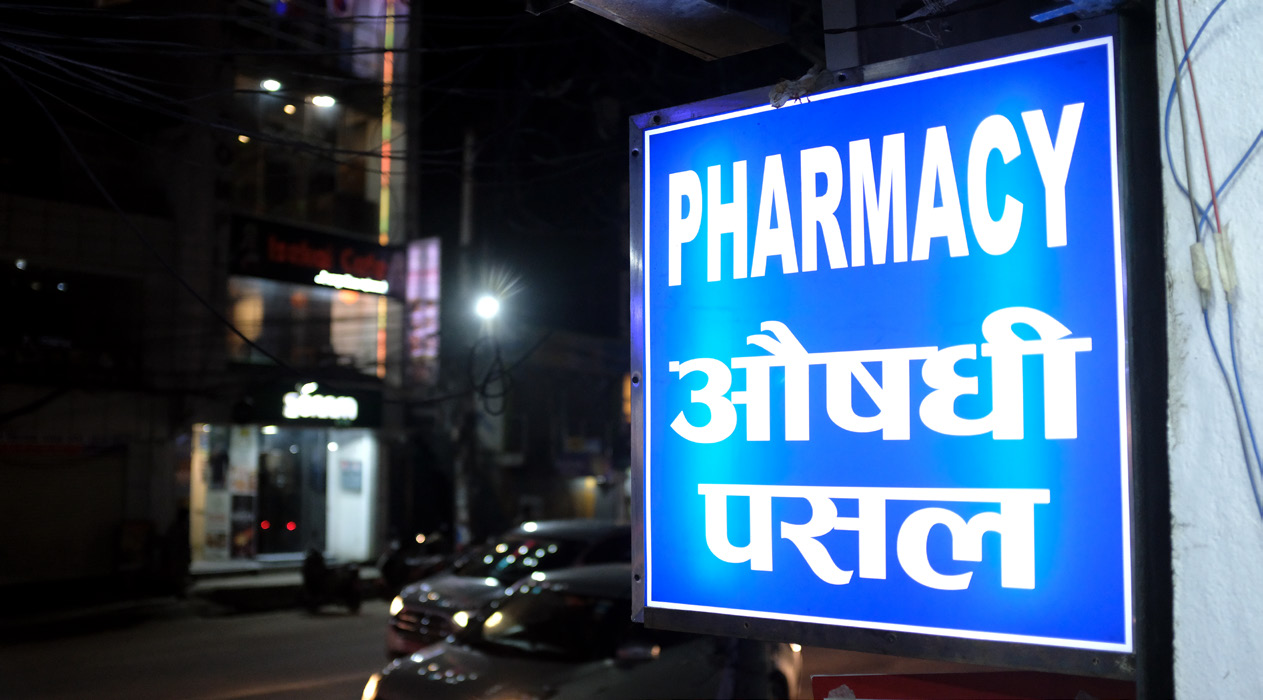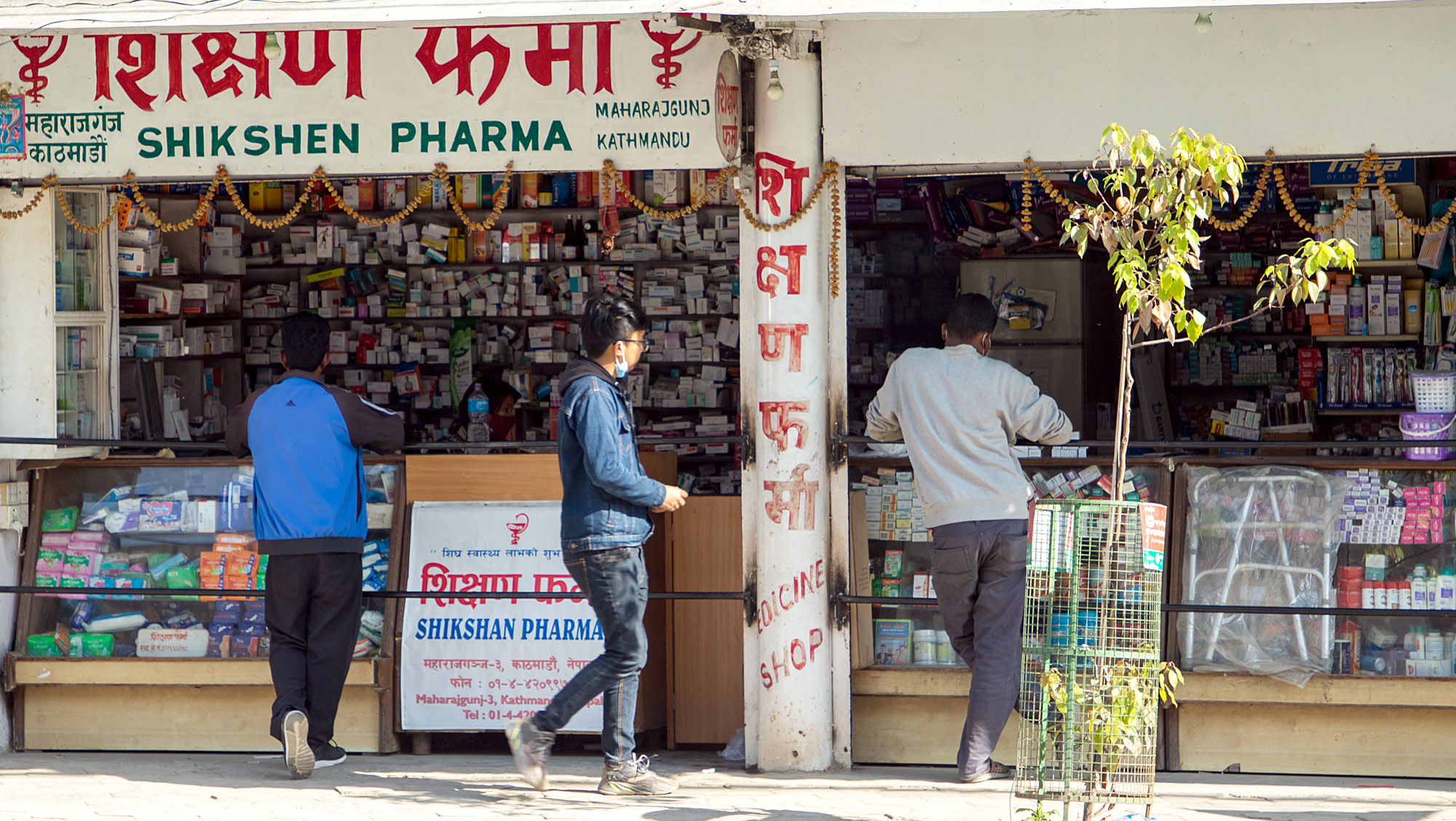Pop a painkiller and get to work—That’s the busy millennial life. An annual medical check-up or that ultrasound to figure out just what’s causing the recurrent what-feels-like heartburn can wait. Meetings, presentations, and paperwork at the office take precedence over our health because, really, who doesn’t have niggling pains and aches every once in a while?
It’s this mindset that has most people self-medicating themselves. Pharmacists around the valley confessed that on a daily basis they have more people coming to buy medicines without a doctor’s prescription than with one. And they aren’t just buying paracetamol or anti-diarrheal pills. More often than not, it’s antibiotics, blood pressure medications, and even psychiatric drugs.
Pharmacist Krishna Dhakal, who has been running Narayani Pharmacy in Thapathali, Kathmandu, for 22 years, says it’s the easy accessibility to drugs that has people becoming their own doctors. A quick Google search of your symptoms and a trip to the nearest pharmacy is most people’s two-step treatment plan.
“This approach is sure to backfire sooner or later. You are doing your health a great disservice if stopping by a pharmacy and buying random medicines is a regular thing,” says Dhakal, adding many people also tend to look at their friends’ cases as reference for self-diagnosis. If so and so medicine cured a friend’s sore throat then it will surely work for them too, they think.
“But each case is unique or there might be an underlying cause of your problem that could get worse without the right treatment,” he says.
According to Nim Raj Tamang, assistant pharmacist at Nirvan Pharmacy in Pulchowk, Lalitpur, earlier it was mostly people from low-income groups who used to visit pharmacies with their health woes. They were trying to save on doctor’s consultation fees. That money, they felt, could be used to buy a month’s supply of medicines. But as the internet became more pervasive, everyone slowly became experts in treating themselves.
Zero faith in healthcare
During the Covid-19 pandemic, Tamang says, many people hoarded antibiotics and took them for a day or two at the slightest hint of a runny nose or cough. This happened and continues to happen because of two reasons, he believes: First, people aren’t aware of antibiotics resistance and what overusing them can lead to and second, most people have a couldn’t-care-less approach to health as long as they aren’t ill or in pain as there is always more important work to be done.
But self-medication isn’t a trend only because it’s convenient. Talking to random people out and about their day—catching up with friends at a coffee shop in Battisputali, shopping at a grocery store in Sanepa, and having masala tea at Pulchowk in the evening—ApEx found that majority of people seem to have no faith in the country’s healthcare system, which is curative rather than preventive.

Doctors, they said, don’t give you more than two minutes or listen to your queries properly unless your condition is serious. The unanimous opinion was that there was no point in annual health checkups or consulting doctors unless you thought there was something seriously wrong with you.
Sarah Shrestha, 32, a public relations officer, says her company pays for an annual full checkup but she, in the past two years, hasn’t been to a hospital. Shrestha says she doesn’t want to spend an entire day at a hospital getting tests after tests done and then another day waiting for the doctor to look at her reports and certify she’s in good health and prescribe vitamins.
“I would know if I was sick, wouldn’t I? So, if doctors aren’t going to tell me how I can stay healthy or counsel me about what I should or shouldn’t do in the future, then I will only schedule an appointment when I’m actually unwell,” she says.
Roshan K.C, 24, who is taking a gap year before going to India for his masters later this year, says a pharmacy visit will suffice for minor ailments because there is nothing a pharmacist won’t tell you that a doctor will.
“Of course, doctors have more knowledge but in Nepal they don’t have the time or the willingness to share that information,” he says.
It seems Nepalis are definitely more inclined than ever to rely on over-the-counter drugs unless they perceive themselves to be in life-threatening situations. Of the 25 people questioned, 24 said hospitals in Nepal were only for emergencies and surgical procedures.
Lasting damages
However, the impact of self-medication is far-reaching. Immediate serious side-effects aside, misuse of drugs can give rise to long-term health problems that are difficult to cure because your body doesn’t respond to treatments. Improper dosage of antibiotics or failure to complete its course could lead to your body becoming resistant to it. You will thus require stronger medicines in the future. Its overuse, on the other hand, could destroy your body’s natural flora making you prone to various infections and diseases.
“Little knowledge is a dangerous thing. As clichéd as that might be, it couldn’t be truer,” says Suman Dawadi, a pharmacist at Sesaang Pharmacy in Thapathali, Kathmandu. He says a lot of times people come to the pharmacy asking for a tablet or two of antibiotics.
“I think in such cases the onus lies on the pharmacists too. We should not sell the medicines, or we should make people aware about the proper dosage and the importance of sticking to the recommended course even when their symptoms go away,” says Dawadi.
The problem is, he says, that is not what happens and one or two pharmacies developing a conscience isn’t going to change much. There isn’t a strict drug regulation and monitoring system in Nepal. Most medicines that shouldn’t be sold over the counter are being bought recklessly without prescriptions.
The Department of Drug Administration under the Ministry of Health and Population has classified drugs into different categories—a, b, and c—with statutory warnings printed in bold red on packages of drugs that shouldn’t be sold without a prescription.
Category ‘a’ consists of narcotic and poisonous drugs. Antibiotics, hormones etc. fall under category ‘b’. These are prescription drugs and can only be sold by a pharmacist or a medical professional. The drugs that fall under category ‘c’ are the only ones that can be sold over the counter, without a prescription.

“Unfortunately, in Nepal, everything is being sold over the counter,” says Dhakal. He says it’s not unusual for people to come with old prescriptions for fresh complaints, claiming the medicine worked in the past and so they will just continue with it. Topping up prescription drugs without going for a follow-up is also quite common. What the doctor intended for you to have for six months, say for high blood pressure, you’ve probably had for a year or more.
“With stricter rules to ensure prescription drugs couldn’t be sold over the counter, people would have to go to see a doctor when they are unwell,” says Sanjit Chaudhary, pharmacist at Alka Hospital Pharmacy in Jawalakhel, Lalitpur.
That alone, however, won’t be effective in curbing the problem, argues his colleague, pharmacist Sajan Chaulagain. The issue here, he points out, is that there are just too many community pharmacies that are often run by people with zero pharmaceutical knowledge. As pharmacies have become business- and not service-oriented, even if a certain pharmacy does not sell prescription drugs without a doctor’s slip, there are bound to be at least ten others that will.
“People need to be cautious where their health is concerned. It’s not something to be taken lightly. We can’t always depend on rules, laws, penalties or on the government,” says Chaulagain.
The way out
Dr Namita Sindan, gynecologist at Paropakar Maternity and Womens’ Hospital in Thapathali, Kathmandu, agrees and says she is appalled by people’s ignorance and carelessness in health matters.
Stringent drug regulation laws wouldn’t hurt but a lot more needs to be done to tackle the problem, says Dr Sindan. There needs to be greater awareness about the long-term repercussions of being negligent with your health. Medical professionals—doctors, nurses, pharmacists—must also strongly dissuade people from self-medicating.
“There was recently a maternal death because the woman had taken random painkillers to manage discomfort. Her child died in the womb and that led to a fatal infection,” she says adding there are also many preventable deaths in the country because women take abortifacient drugs to terminate unwanted pregnancies without medical advice.
There are many contraindications for drug use, especially in case of antibiotics and other prescription medicines. A medical personnel can determine which drug will work in which case and when a certain medicine shouldn’t be administered. This knowledge comes from training and practice. An internet search or even pharmacists can’t give this information to you.
A general consensus among medical experts seemed to be that people could explore telemedicine that enable them to get health-related services and information through video-conferencing apps and tools. Something is better than nothing is the principle that could be applied here, says Dawadi, adding when even simple over-the-counter medications can have rare but severe adverse reactions, it’s best to err on the side of caution.
“There is no substitute for expert advice. A consultation or checkup instead of popping random medicines could save you from many unnecessary health troubles, if not potentially save your life,” concludes Dr Sindan.











